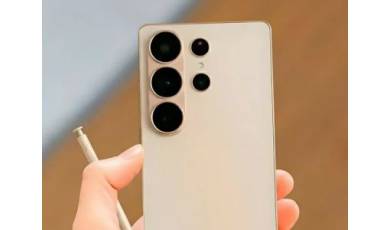Flash firmware on Vivo X6S Plus D
Mobiles >> Vivo >> Vivo X6S Plus D| Specifications | Reviews | Secret codes |
| Unlock phone | Root phone |
| Backup | Flash Firmware | Screenshot |
How to flash Vivo X6S Plus D?
Why reinstall the firmware?
Errors start to appear in the operating system.
Apps won't open.
Many programs from the Play Market do not work.
The phone restarts by itself for no reason.
The phone slows down a lot during operation.
The OS does not match the system requirements of the smartphone.
Where can I find the firmware?
On the website of your phone manufacturer.
On sites where developers post custom or official OS.
What should be done before installing the firmware?
Create a backup copy of user data and transfer it to your computer.
Insert an SD card into the gadget. It must have enough memory for the firmware.
Find information about your smartphone model.
Fully charge your device. If the battery runs out during the firmware, the device will no longer turn on.
Download archive with Firmware. Place it on the SD card.
Installing TWRP Recovery
Install the Official TWRP App from the Play Store on your phone. And run this application.
At the first start, you need to give consent to future manipulations, as well as consent to granting the Superuser rights to the application. Check the checkboxes and press the 'OK' button.
On the next screen, you need to select the 'TWRP FLASH' item and give the application root-rights.
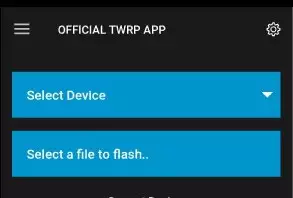
On the main screen of the application, select 'Select Device', and find your phone model.
After selecting the phone, the program will redirect the user to a web page to download the corresponding image file of the modified recovery environment. Download the proposed *.img file.
After downloading the image file, return to the main screen of the Official TWRP App and press the 'Select a file to flash' button. Select the file downloaded in the previous step.
Click the 'FLASH TO RECOVERY' button and confirm your choice, click 'OK' in the question window.
The recording process is very fast, and upon completion, the message 'Flash Completed Succsessfuly!' appears. Click 'OK'. The TWRP installation procedure can be considered complete.
Write the firmware to the SD card. Using a PC or laptop card reader.
Insert a SD memory card into the phone.
To reboot into recovery, you need to use a special item in the Official TWRP App menu, accessible by pressing the button with three stripes in the upper left corner of the main screen of the application. We open the menu, select the 'Reboot' item, and then click on the 'REBOOT RECOVERY' button. The phone will reboot into the recovery environment automatically.
Firmware via TWRP
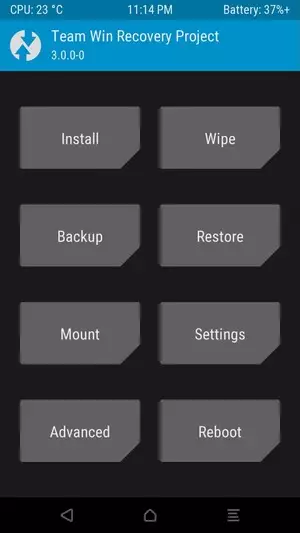
Before flashing, it is recommended to clear the 'Cache' and 'Data' sections. This will delete all user data from the device, but avoid a wide range of software errors and other problems. You must press 'WIPE' on the main screen.
Now you can start flashing. Click the 'Install' button.
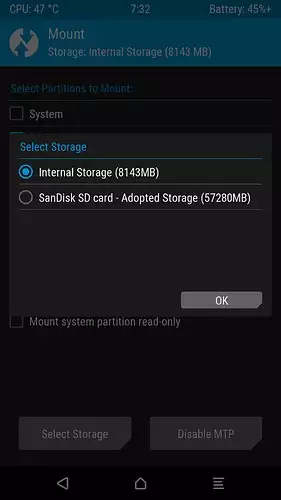
On the file selection screen, at the very top there is a 'Storage' button for selecting an SD card.
Select the location where the files were copied. Press the 'OK' button.
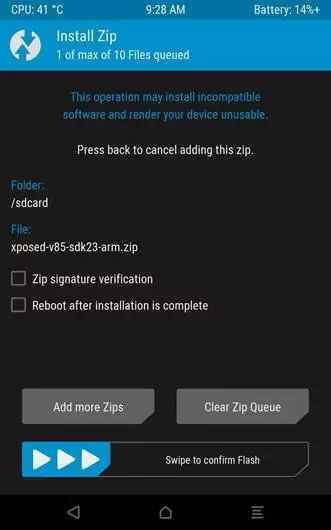
Select the firmware file and click on it. A screen opens with a warning about possible negative consequences, as well as the item 'Zip signature verification'. This item should be checked by placing a cross in the check-box, which will avoid using damaged files when writing to the phone's memory sections.
The procedure for writing files to the phone's memory will begin, accompanied by logging and filling in the progress bar.
The completion of the firmware installation procedure is indicated by the inscription 'Successful'.
Summary: Type: Mobile; Battery: Li-Ion 3000 mAh; CPU: Mediatek MT6752, Octa Core, 1.7GHz, ARM Mali-T760MP2; Smart Phone OS: Android 5.1.1; Dimensions: 147.90 x 73.75 x 6.56 mm; Formfactor: Bar; Keyboard: Screen; Sidekeys: Volume; Softkeys: 2; Weight: 155.5 g; Color: Yes; Colors: 16M; Other: Capacitive Touchscreen, Multitouch, Corning Gorilla Glass 3; Pixel aspect ratio: 3.00; Resolution: 568x320; Display PPI: 386; Screen Size: 5.7; Type: Super AMOLED; Audio: MP3, ACC, AAC+, WAV, AMR; Camera: 13MP, 4128 x 3096; Other: Continuos Shooting, Geo-Tagging, High Dynamic Range (HDR), Touch to Focus, LED Flash, Video Sharing, Video Calling, Macro Mode, Music Player, Video Player, Burst ...
Comments, questions and answers on the flash firmware Vivo X6S Plus D
Ask a question about Vivo X6S Plus D

